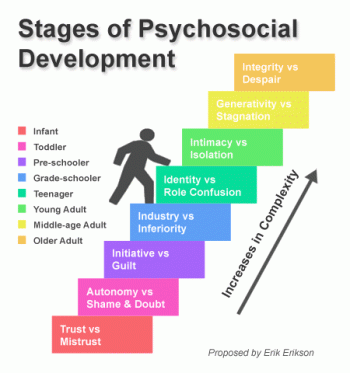Month 56
"Children love and want to be loved and they very much prefer the joy of accomplishment to the triumph of hateful failure. Do not mistake a child for his symptom." (Childhood and Society, 1950)

Erik Erikson, a German psychoanalyst heavily influenced by Sigmund Freud, developed a psychosocial theory about human stage development from birth to death.
He focused on how peoples' sense of identity develops; how people develop or fail to develop abilities and beliefs about themselves which allow them to become productive, satisfied members of society.
As per the psychosocial theory, there are 8 stages of development. The third stage, initiative versus guilt, spans ages three to six years.
Children during this phase develop initiative, they continue to develop their self-concept and gain a desire to try new things and to learn new things while being responsible for their actions to some extent. If caregivers continue to give children a safe space to experiment and appropriate stimuli to learn, the children will continue to find their purpose.
However, if caregivers try to create too many strict boundaries around what children can do and to force too much responsibility on kids, children will feel extreme guilt for their inability to complete tasks perfectly.
How I think @ 56 months
At this stage, children develop greater self-control and ingenuity. Their pretend play is more complex and imaginative and can be sustained for longer periods. They can also make plans and complete tasks. They want to try new experiences. They also want to be more self-reliant and seek to expand the areas of their lives where they can be independent decision-makers.
Motor Development: Gross Motor Skills
• I run skillfully and negotiate space successfully, adjusting speed or direction to avoid obstacles
• I can stand momentarily on one foot
• I can catch a large ball
Motor Development: Fine Motor Skills
• I can draw lines and circles using gross motor movements
• I can use one-handed tools and equipment, e.g. makes snips in paper with child scissors
• I can hold pencil between thumb and two fingers, no longer using whole-hand grasp
• I can copy some letters, e.g. letters from my name
Language and Thinking Development
• I can understand the use of objects (e.g. “What do we use to cut things?’)
• I show understanding of prepositions such as ‘under’, ‘on top’, ‘behind’ by carrying out an action or selecting correct picture
• I respond to simple instructions, e.g. to get or put away an object
• I understand ‘why’ and ‘how’ questions
Social and Emotional Development
• I am aware of my own feelings, and know that some actions and words can hurt others’ feelings
• I have begun to accept the needs of others and can take turns and share resources, sometimes with support from others
• I can usually tolerate delay when needs are not immediately met, and I understand that wishes may not always be met!
• I can usually adapt behavior to different events, social situations and changes in routine
Activities
Disclaimer: This presents an overview of child development. It is important to keep in mind that the time frames presented are averages and some children may achieve various developmental milestones earlier or later than the average but still be within the normal range of development. This information is presented to help parents understand, at a high level, what to expect from their child. Any questions/concerns you may have about your child’s development should be shared with your doctor.




